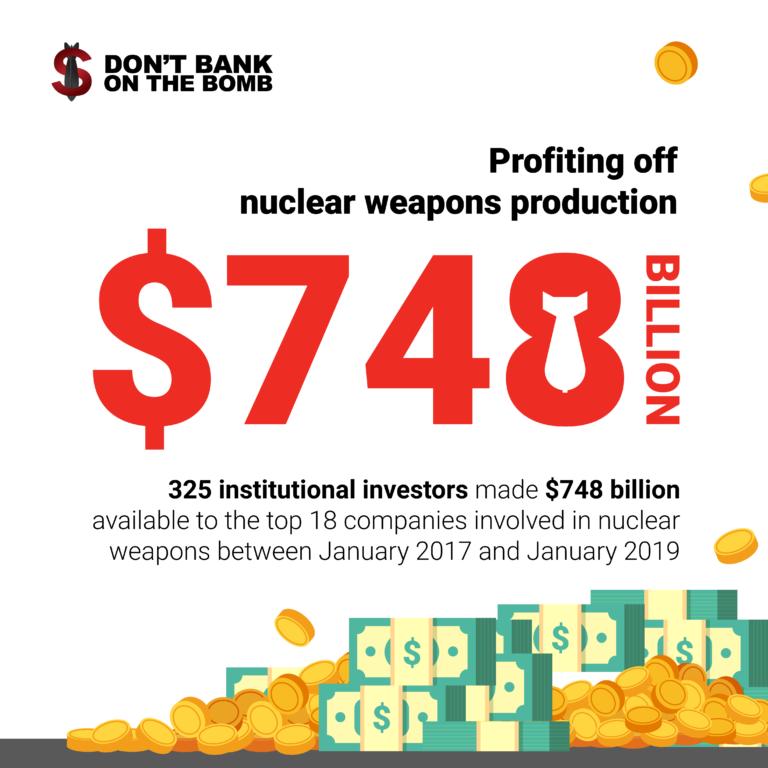Shorting our security- Financing the companies that make nuclear weapons
Who is trying to profit from weapons of mass destruction?
Our report: Shorting our security- Financing the companies that make nuclear weapons provides the answer.
Key findings
Total invested in top nuclear weapon producers: $748 billion
When examining the top companies involved in the nuclear weapon industry, we found over 748 billion USD invested in these companies by 325 financial institutions between January 2017 and January 2019. This reflects investments in the top 18 nuclear weapon producing companies, and is a snapshot provided for comparison purposes.These investments do not include loans that have expired or matured as of 1 January 2019 and reflect a threshold of 0.5% outstanding stocks and bonds.
Which financial institutions are included?
Visit the main Don’t Bank on the Bomb page for the complete list of 325 financial institutions.
10 Financial Institutions made more than half of all investments
More than half of all investments were made by ten financial institutions: Vanguard, BlackRock, Capital Group, State Street, Verisight (now known as Newport Group), T. Rowe Price, Bank of America, JPMorgan Chase, Wells Fargo, and Citigroup.
Comparison to previous analysis shows 42% increase in financing
The total amount invested increased by 42% from US$ 525 billion in the previous report to US$ 748 in this report. The most significant changes were increases in investments in Boeing (192%) and Thales (300%), while investments in Bechtel and Serco dropped.
The amount of outstanding stock for Boeing has increased dramatically in the past year. In the last report, total Boeing shareholding amounted to US$ 59,650 million, whereas this report is showing total outstanding Boeing shares in the amount of US$ 254,296 million. The financial research period for this report concluded before the latest Boeing 737 Max airplane crash, and the subsequent challenges the company faced. Boeing ended 2018 with earnings of $10.46 billion or $17.85 per share on revenue of $101.13 billion, and Boeing continues to capitalise on contracts for drones and planes, as well as for other technologies (including nuclear missiles). The increase in the total amount invested in Boeing is due mostly to the rising share price of Boeing that started late 2016: Boeing has seen a roughly 40% share price increase since the publication of our previous report.
When examining the overall comparison excluding Boeing, there is still an increase in the overall amount of money invested, but it is not nearly so dramatic: 494 billion in 2019 vs 438 billion in 2018, a change of only 13%.
Don’t Bank on the Bomb does not list every single investment into the companies listed as part of the nuclear weapon industry. The report does not include investments made by governments, universities, or churches, only financial institutions. This selection of financial institutions is limited by a reporting threshold. Only share and bond holdings larger than 0.5% of the total number of outstanding shares of the nuclear weapon producing companies are listed. The reason for this is practical: a threshold of 0.1% for example would have resulted in a report profiling nearly 3,000 financial institutions, with mostly minuscule investments. Instead, this report focuses on the institutional investors that choose every day where to put their clients’ money.
The information is also limited to information available in the public domain. Although the sources on which the information is based are reputable and well-known, they are themselves not comprehensive. The numbers provided in the report are therefore a conservative estimation of the total global investments in the nuclear weapons industry.
